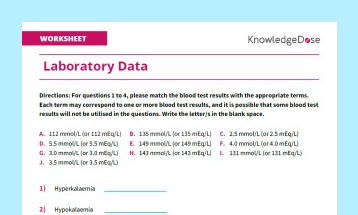Here is a list of some medical terms with definitions describing some clinical signs and symptoms which you may encounter whilst working as a pre-registration pharmacist or pharmacist in community pharmacy, hospital pharmacy or primary care. Examples of scenarios in which you may come across these clinical signs and symptoms may be when reading a patient’s notes, performing a clinical check on a discharge prescription, reading a summary of product characteristics or having a conversation with a doctor mentioning the clinical sign or symptom.
|
Medical Terms |
Meaning |
|---|---|
|
Amenorrhoea |
Absence or cessation of menstrual periods. |
|
Anorexia |
Loss of appetite. |
|
Anuria |
Failure of the kidneys to produce urine. |
|
Arthralgia |
Pain in a joint. |
|
Ascites |
Accumulation of fluid in the peritoneal cavity causing abdominal swelling. |
|
Ataxia |
Shaky movements and unsteady gait caused by the brain’s failure to regulate the body’s posture and the strength and direction of limb movements. |
|
Bruxism |
Habit of grinding the teeth, usually during sleep. |
|
Cachexia |
A general weight loss, weakness and wasting associated with chronic disease. |
|
Claudication |
Limping, usually referring to intermittent claudication. |
|
Convulsion |
Involuntary contraction of muscles producing contortion of the body and limbs. |
|
Cyanosis |
Bluish-purple discoloration of the skin and mucous membranes resulting from an inadequate amount of oxygen in the blood. |
|
Dysmenorrhoea |
Painful menstruation. |
|
Dyspareunia |
Painful or difficult sexual intercourse experienced by a woman. |
|
Dyspepsia |
Dyspepsia, also known as indigestion which causes pain or discomfort in the lower chest or abdomen. |
|
Dysphagia |
Difficulty in swallowing. |
|
Dyspnoea |
Difficulty in breathing. |
|
Dysuria |
Difficult or painful urination. |
|
Enuresis |
Involuntary passing of urine. |
|
Epistaxis |
Nosebleed. |
|
Febrile |
Relating to or affected with fever. |
|
Flatulence |
Excess amount of gas in the stomach and intestines. |
|
Haematemesis |
Vomiting of blood. |
|
Haematuria |
Presence of blood in the urine. |
|
Haemoptysis |
Coughing up of blood. |
|
Hoarseness |
Voice changes e.g. rough or harsh in sound. |
|
Hypoxaemia |
Abnormally low levels of oxygen in the arterial blood. |
|
Jaundice |
Yellowing of skin or whites of the eyes, indicating excess bilirubin in the blood. |
|
Malaise |
General feeling of being unwell which may be accompanied by identifiable physical discomfort and may indicate the presence of disease. |
|
Melaena |
Black tarry faeces due to the presence of partly digested blood from higher up the digestive tract. |
|
Menorrhagia |
Excessive heavy bleeding occurring at menstruation, which may be associated with excessively long periods. |
|
Micturition |
Urination. |
|
Myalgia |
Pain in the muscles. |
|
Nausea |
Feeling one is about to vomit. |
|
Nocturia |
Need to wake up during the night to pass urine. |
|
Odynophagia |
Pain on swallowing. |
|
Oedema |
Excessive accumulation of fluid in the body tissues. |
|
Oliguria |
Production of an abnormally small volume of urine. |
|
Orthopnoea |
Breathlessness that prevents the patient from lying down, so that the patient has to sleep propped up in bed or sitting in a chair. |
|
Orthostatic hypotension |
Low blood pressure that occurs when standing up from sitting or lying down. |
|
Otalgia |
Earache. |
|
Pallor |
Abnormal paleness of the skin. |
|
Paraesthesia |
Spontaneously abnormal tingling sensations. It is sometimes described as pins and needles. |
|
Pharyngitis |
Inflammation of the pharynx. |
|
Polydipsia |
Excessive thirst, leading to the drinking of large quantities of fluid. |
|
Polyuria |
Production of large volumes of urine. |
|
Pruritus |
Itching. |
|
Purulent |
Forming, consisting of, or containing pus. |
|
Pyrexia |
Fever. |
|
Rhinitis |
Inflammation of the nasal mucous membrane. |
|
Rhinorrhoea |
Persistent watery mucous discharge from the nose. |
|
Rigor |
Abrupt attack of shivering and feeling cold, accompanied by a rapid rise in body temperature which often marks the onset of a fever. |
|
Splenomegaly |
Enlargement of the spleen. |
|
Steatorrhoea |
Passage of abnormal increased amounts of fat in the faeces due to the reduced absorption of fat by intestine. |
|
Stridor |
Noise heard on breathing (high pitched sound) when the trachea or larynx is obstructed. |
|
Syncope |
Fainting. |
|
Tachypnoea |
Rapid breathing. |
|
Tinnitus |
Sensation of sounds in the ears or head in the absence of external sound. |
|
Xerostomia |
Dry mouth. |
Please note this is not an exhaustive list of signs and symptoms encountered in clinical practice.
References:
1. Martin EA, editor. Concise Medical Dictionary. 8th ed. Oxford: Oxford University Press; 2010.
2. MediLexicon Medical Dictionary (Powered by Stedman’s). Available at: https://www.medilexicon.com/dictionary [Accessed on 14/03/2019].




